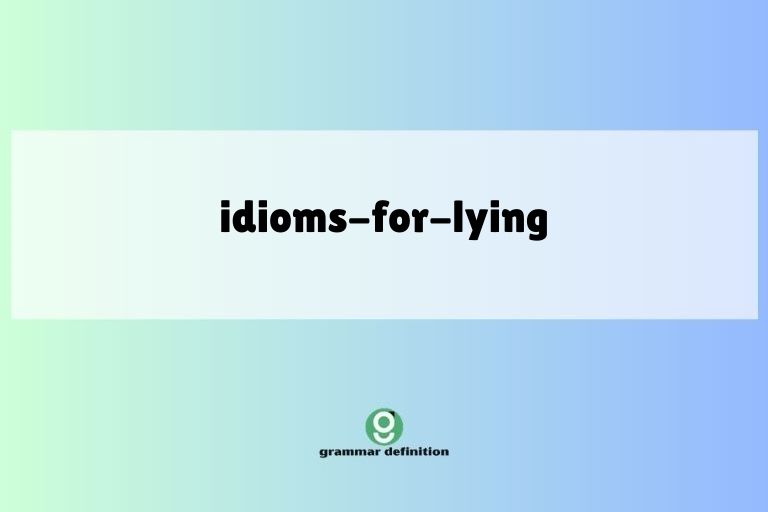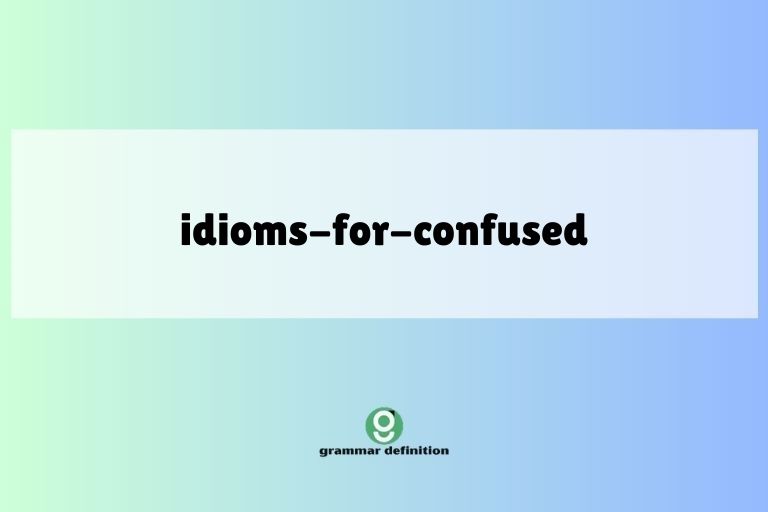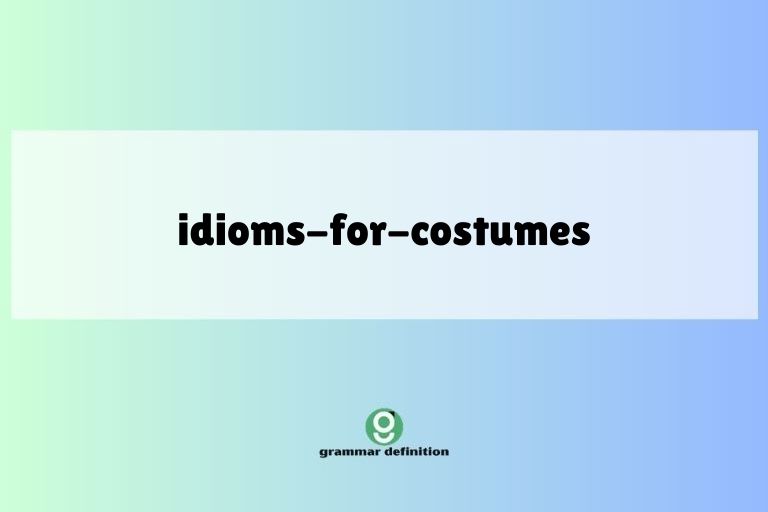Idioms for Lying: A Comprehensive Guide

Understanding idioms is crucial for mastering English, and idioms related to lying are particularly useful in everyday conversation and literature. These expressions often convey nuances that literal language cannot, adding color and depth to communication.
This article provides a comprehensive guide to idioms for lying, detailing their meanings, usage, and structural elements. It is designed for English language learners, teachers, and anyone interested in enhancing their understanding of figurative language.
Table of Contents
- Introduction
- Definition of Idioms for Lying
- Structural Breakdown
- Types and Categories of Idioms for Lying
- Examples of Idioms for Lying
- Usage Rules for Idioms for Lying
- Common Mistakes When Using Idioms for Lying
- Practice Exercises
- Advanced Topics
- Frequently Asked Questions
- Conclusion
Definition of Idioms for Lying
An idiom is a phrase or expression whose meaning cannot be understood from the ordinary meanings of its individual words. It’s a figurative expression that has a meaning different from the literal meaning of its elements.
Idioms for lying are expressions used to describe the act of not telling the truth, deceiving someone, or misrepresenting facts.
These idioms allow speakers to convey the concept of lying in a more colorful, indirect, and often humorous way. They can range from gentle euphemisms to harsh accusations, depending on the context and the speaker’s intent.
Understanding these idioms is essential for comprehending spoken and written English, as they are frequently used in conversations, literature, and media.
Classification
Idioms for lying can be classified based on their level of formality, the severity of the accusation, and the specific imagery they evoke. Some are gentle and indirect, while others are blunt and accusatory.
Some use metaphors related to physical actions (e.g., “pulling someone’s leg”), while others use metaphors related to speech or character (e.g., “speaking with a forked tongue”).
Function
The primary function of idioms for lying is to describe dishonesty in a non-literal way. This can soften the impact of the accusation, add humor to the situation, or provide a more vivid and memorable description of the act of lying.
Idioms allow speakers to express their feelings about the lie and the liar in a more nuanced way than simply saying “He lied.”
Contexts
Idioms for lying are used in various contexts, including:
- Everyday conversation: To describe minor instances of dishonesty or exaggeration.
- Literature: To add depth and character to dialogue and narration.
- News and media: To report on political scandals and public deception.
- Legal settings: (Though often avoided in formal testimony) to describe perjury or false statements.
- Humorous situations: To create comedic effect by exaggerating or downplaying the act of lying.
Structural Breakdown
The structure of idioms for lying varies greatly. Some are simple phrases, while others are more complex clauses.
They often involve:
- Metaphors: Using a word or phrase to refer to something it isn’t, in order to suggest a similarity (e.g., “spinning a yarn”).
- Similes: Comparing two things using “like” or “as” (e.g., “as crooked as a dog’s hind leg”).
- Hyperbole: Exaggeration for emphasis or effect (e.g., “stretching the truth”).
- Understatement: Deliberately downplaying the significance of something (e.g., “a bit of a fib”).
The grammatical structure of these idioms can be analyzed in terms of their parts of speech. Many idioms contain verbs (e.g., “fib”), nouns (e.g., “tall tale”), adjectives (e.g., “crooked”), and adverbs (e.g., “bald-faced”).
The combination of these elements creates the unique meaning of the idiom.
Types and Categories of Idioms for Lying
Idioms for lying can be categorized based on the severity of the lie, the intention behind it, and the specific imagery they evoke. Here are some common categories:
Mild Lies and Exaggerations
These idioms describe small, harmless lies or exaggerations, often used to avoid hurting someone’s feelings or to make a story more interesting.
Serious Lies and Deceptions
These idioms describe deliberate attempts to deceive someone, often with serious consequences.
Avoiding the Truth
These idioms describe situations where someone is not directly lying, but is avoiding telling the whole truth or is being evasive.
Misleading Someone
These idioms focus on the act of leading someone to believe something that is not true, often through intentional deception or trickery.
Covering Up
These idioms describe attempts to hide the truth or conceal evidence of wrongdoing.
Examples of Idioms for Lying
The following tables provide extensive examples of idioms for lying, categorized by their type. Each entry includes the idiom, its meaning, and an example sentence.
Mild Lies and Exaggerations Examples
This table provides examples of idioms that describe mild lies or exaggerations, often used in casual conversation.
| Idiom | Meaning | Example Sentence |
|---|---|---|
| White lie | A harmless or trivial lie, often told to avoid hurting someone’s feelings. | I told a white lie about liking her new haircut to make her feel better. |
| Stretch the truth | To exaggerate or distort the truth. | He stretched the truth about his accomplishments to impress his boss. |
| Little white lie | Similar to “white lie,” a small, harmless untruth. | She told a little white lie to avoid going to the party. |
| Fib | A small, unimportant lie. | He told a fib about his age to get a discount. |
| Tell a tall tale | To tell a story that is exaggerated and hard to believe. | Grandpa loves to tell tall tales about his adventures in the war. |
| Exaggerate | To represent something as being larger, better, or worse than it really is. | She tends to exaggerate when she talks about her travels. |
| Overstate | To express or state something too strongly; exaggerate. | He overstated his knowledge of the subject to impress the interviewer. |
| Embellish | To make something more attractive by the addition of decorative details or features. | She likes to embellish her stories with colorful details. |
| Pad the truth | To add unnecessary or misleading information to a statement to make it appear better or more impressive. | He padded the truth on his resume to get the job. |
| Color the truth | To present the truth in a way that is slightly misleading or biased. | She colored the truth to make herself look better in the situation. |
| Romanticize | To deal with or describe in an idealized or unrealistic fashion; make (something) seem better or more appealing than it really is. | The movie romanticized the hardships of pioneer life. |
| Spin a yarn | To tell a story, especially a long and imaginative one. | He spun a yarn about his encounter with a celebrity. |
| Cook up a story | To invent a story or excuse, often one that is not true. | He cooked up a story about being sick to avoid going to work. |
| Make up a story | To invent a story, often to deceive or entertain. | She made up a story about finding a lost puppy. |
| Bend the truth | To slightly alter or distort the truth. | He bent the truth to avoid getting into trouble. |
| Play fast and loose with the truth | To be careless or dishonest with the truth. | He played fast and loose with the truth when he testified in court. |
| Take liberties with the truth | To alter or distort the truth without permission or justification. | The journalist took liberties with the truth in his article. |
| Use a little artistic license | To deviate slightly from the truth for the sake of making a story more interesting or entertaining. | The author used a little artistic license in his historical novel. |
| Be economical with the truth | To avoid telling the whole truth or to be deliberately vague. | He was economical with the truth when asked about his whereabouts. |
| Sugarcoat | To make something seem more pleasant or acceptable than it really is. | She tried to sugarcoat the bad news, but it was still upsetting. |
| Downplay | To make something appear less important than it really is. | The company tried to downplay the severity of the environmental damage. |
| Minimize | To represent or estimate at less than the true value or magnitude. | He tried to minimize the importance of his mistake. |
| Soft-pedal | To treat or present (something) in a restrained or understated way. | The politician soft-pedaled his controversial views during the campaign. |
| Put a spin on | To present (information) in a way that is favorable to oneself or one’s cause. | The PR team put a spin on the company’s financial losses. |
| Gloss over | To avoid or disregard something; to treat something as unimportant. | The report glossed over the negative aspects of the project. |
Serious Lies and Deceptions Examples
This table focuses on idioms that describe serious lies and deliberate attempts to deceive.
| Idiom | Meaning | Example Sentence |
|---|---|---|
| Lie through one’s teeth | To tell a blatant lie without any hesitation or remorse. | He lied through his teeth when he said he didn’t know anything about the theft. |
| Pull the wool over someone’s eyes | To deceive or trick someone. | The con artist tried to pull the wool over the old lady’s eyes. |
| Lead someone down the garden path | To deceive someone, often by making them believe something that is not true. | The salesman led him down the garden path with promises of high returns. |
| Take someone for a ride | To deceive or exploit someone. | The mechanic took him for a ride by charging him for unnecessary repairs. |
| Double-cross | To betray someone, especially someone who trusts you. | He double-crossed his partner by selling the company secrets. |
| Two-time someone | To cheat on a romantic partner. | She found out that her boyfriend was two-timing her. |
| Betray someone | To be disloyal to someone who trusts you. | He betrayed his friends by revealing their secrets to the enemy. |
| Sell someone down the river | To betray someone for personal gain. | He sold his colleague down the river to get a promotion. |
| Stab someone in the back | To betray someone who trusts you. | He stabbed his friend in the back by spreading rumors about him. |
| Deceive | To cause someone to believe something that is not true. | The company deceived investors with false financial statements. |
| Mislead | To give someone the wrong idea or impression. | The advertisement misled consumers about the product’s capabilities. |
| Hoodwink | To deceive or trick someone. | The con man hoodwinked the tourists out of their money. |
| Bamboozle | To deceive or trick someone. | He bamboozled the audience with his magic tricks. |
| Con | To deceive or trick someone into doing something. | The con artist conned the elderly woman out of her life savings. |
| Swindle | To use deception to deprive someone of money or possessions. | He swindled investors out of millions of dollars. |
| Defraud | To illegally obtain money from someone by deception. | The accountant defrauded the company by embezzling funds. |
| Dupe | To deceive or trick someone. | He duped his friend into investing in a fake company. |
| Take advantage of | To exploit someone or something for one’s own benefit. | He took advantage of her trust to steal her money. |
| Run a game on someone | To deceive or manipulate someone. | He was running a game on her to get her to do what he wanted. |
| Pull a fast one | To deceive someone quickly and cleverly. | He tried to pull a fast one on the cashier, but she caught him. |
| Have ulterior motives | To have a hidden reason for doing something. | He had ulterior motives for being so nice to her. |
| Not be on the level | To be dishonest or deceitful. | The deal didn’t seem to be on the level, so they walked away. |
| Be as crooked as a dog’s hind leg | Extremely dishonest. | That politician is as crooked as a dog’s hind leg. |
| Be a wolf in sheep’s clothing | A person who appears harmless but is actually dangerous. | He seemed nice at first, but he turned out to be a wolf in sheep’s clothing. |
| Have a hidden agenda | To have a secret plan or intention. | She had a hidden agenda for inviting him to the party. |
Avoiding the Truth Examples
This table provides idioms for situations where someone avoids telling the whole truth.
| Idiom | Meaning | Example Sentence |
|---|---|---|
| Beat around the bush | To avoid talking directly about something, often because it is unpleasant or embarrassing. | Stop beating around the bush and tell me what really happened. |
| Dance around the issue | Similar to “beat around the bush,” to avoid addressing a topic directly. | The politician danced around the issue of tax increases during the debate. |
| Evasive | Avoiding giving a direct answer or clear statement. | He was evasive when asked about his involvement in the scandal. |
| Circumlocution | The use of many words where fewer would do, especially in a deliberate attempt to be vague or evasive. | His speech was full of circumlocution, making it difficult to understand his true intentions. |
| Prevaricate | To speak or act in an evasive way. | He prevaricated when asked about his alibi. |
| Be economical with the truth | To avoid telling the whole truth. | He was economical with the truth when describing his past employment. |
| Skirt the issue | To avoid dealing with a problem or issue. | The report skirted the issue of government corruption. |
| Sidestep | To avoid answering a question directly. | The politician sidestepped the reporter’s question about his personal finances. |
| Duck the question | To avoid answering a question. | He ducked the question by changing the subject. |
| Stall for time | To delay something in order to gain time. | He stalled for time while waiting for his accomplice to arrive. |
| Play for time | Similar to “stall for time,” to delay in order to gain an advantage. | The lawyer played for time while preparing his defense. |
| Keep mum | To remain silent about something. | He kept mum about his plans to surprise her. |
| Hold back | To restrain oneself from saying something. | She held back her true feelings to avoid hurting his feelings. |
| Not let on | To not reveal a secret or one’s true feelings. | He didn’t let on that he knew about the surprise party. |
| Keep something close to one’s chest | To keep something secret. | He kept his plans close to his chest until the last minute. |
| Play one’s cards close to one’s chest | Similar to “keep something close to one’s chest,” to be secretive about one’s plans. | She played her cards close to her chest during the negotiations. |
| Be cagey | Reluctant to give information owing to caution or suspicion. | He was cagey about his whereabouts on the night of the crime. |
| Be guarded | Cautious and reserved. | She was guarded in her responses to the reporter’s questions. |
| Remain tight-lipped | Refusing to speak about something. | He remained tight-lipped about the details of the investigation. |
| Give a non-answer | To provide a response that avoids the question. | The politician gave a non-answer to the reporter’s question about his tax returns. |
| Be vague | Not clearly expressed or defined. | He was deliberately vague about his intentions. |
| Obfuscate | To make something unclear, obscure, or unintelligible. | The company tried to obfuscate the details of the scandal. |
| Muddy the waters | To make something unclear or confusing. | The rumors only muddied the waters and made it harder to find the truth. |
| Cloud the issue | To make something more difficult to understand. | The false information only clouded the issue further. |
Usage Rules for Idioms for Lying
Using idioms correctly requires understanding their specific meanings and contexts. Here are some key usage rules:
- Context is crucial: Consider the situation and your audience when choosing an idiom. Some idioms are informal and inappropriate for formal settings.
- Know the meaning: Ensure you understand the precise meaning of the idiom before using it. Misusing an idiom can lead to confusion or miscommunication.
- Pay attention to grammar: Use the correct verb tense and subject-verb agreement when incorporating idioms into sentences.
- Be aware of regional variations: Some idioms are specific to certain regions or dialects. Be mindful of your audience’s background.
- Don’t overuse: While idioms can add color to your language, overuse can make your speech sound unnatural or contrived.
Common Mistakes When Using Idioms for Lying
Here are some common mistakes learners make when using idioms for lying:
| Incorrect | Correct | Explanation |
|---|---|---|
| He lied from his teeth. | He lied through his teeth. | The correct idiom is “lie through one’s teeth,” not “lie from one’s teeth.” |
| They pulled the leg of him. | They pulled his leg. | The correct idiom is “pull someone’s leg,” not “pull the leg of someone.” |
| She is beating around the plants. | She is beating around the bush. | The correct idiom is “beat around the bush,” not “beat around the plants.” |
| He took me for a walk. | He took me for a ride. | “Take someone for a walk” has a literal meaning; the idiom meaning “deceive” is “take someone for a ride.” |
| She is as crooked as a dog’s knee. | She is as crooked as a dog’s hind leg. | The correct idiom is “as crooked as a dog’s hind leg,” not “as crooked as a dog’s knee.” |
Practice Exercises
Test your understanding of idioms for lying with these practice exercises.
Exercise 1: Multiple Choice
Choose the correct idiom to complete each sentence.
| Question | Options | Answer |
|---|---|---|
| He was _______ when he said he didn’t know anything about the missing money. | (a) beating around the bush (b) lying through his teeth (c) stretching the truth | (b) lying through his teeth |
| The salesman tried to _______ by promising unrealistic returns on the investment. | (a) pull the wool over my eyes (b) keep mum (c) downplay | (a) pull the wool over my eyes |
| She was _______ about her past, refusing to reveal any details. | (a) economical with the truth (b) playing her cards close to her chest (c) exaggerating | (b) playing her cards close to her chest |
| The politician _______ the issue of climate change during the debate. | (a) skirted (b) told a white lie (c) embellished | (a) skirted |
| He _______ the story to make it more exciting. | (a) bent the truth (b) cooked up (c) embroidered | (c) embroidered |
| She _______ to avoid hurting his feelings. | (a) told a white lie (b) stabbed him in the back (c) misled | (a) told a white lie |
| The company _______ the extent of the damage caused by the oil spill. | (a) took for a ride (b) downplayed (c) betrayed | (b) downplayed |
| He _______ about his accomplishments to impress the interviewer. | (a) kept mum (b) stretched the truth (c) remained tight-lipped | (b) stretched the truth |
| They tried to _______ by presenting false evidence in court. | (a) pull a fast one (b) be economical with the truth (c) beat around the bush | (a) pull a fast one |
| He _______ when he said he was working late, but he was actually at the bar. | (a) lied through his teeth (b) exaggerated (c) was cagey | (a) lied through his teeth |
Exercise 2: Fill in the Blanks
Fill in the blanks with the appropriate idiom for lying.
| Question | Answer |
|---|---|
| He didn’t want to tell her the bad news directly, so he started to __________. | beat around the bush |
| The con artist managed to __________ and steal all her savings. | pull the wool over her eyes |
| She realized that her friend had __________ by revealing her secret to everyone. | stabbed her in the back |
| The politician tried to __________ the issue of corruption by changing the subject. | skirt the issue |
| He admitted that he had __________ to make himself look better. | stretched the truth |
| She decided to __________ about her age to get a discount. | tell a fib |
| The company was accused of __________ investors with misleading financial reports. | misleading |
| He had __________ for helping her; he wanted something in return. | ulterior motives |
| She suspected that he was __________ and couldn’t be trusted. | not on the level |
| He tried to __________ the importance of his mistake, but it was a serious error. | downplay |
Exercise 3: Sentence Completion
Complete the following sentences using an appropriate idiom for lying.
| Question | Answer |
|---|---|
| Instead of giving a straight answer, the politician chose to… | …dance around the issue. |
| The scammer attempted to… | …take them for a ride with promises of quick riches. |
| Knowing the truth would hurt her, he decided to… | …tell a white lie to spare her feelings. |
| The journalist discovered that the company had been… | …cooking up a story about their environmental impact. |
| To avoid revealing her true intentions, she decided to… | …play her cards close to her chest. |
| Because he didn’t want to admit he was wrong, he tried to… | …muddy the waters with irrelevant details. |
| The witness was clearly… | …lying through his teeth on the stand. |
| She realized her business partner had… | …sold her down the river by making a secret deal. |
| The suspect’s answers were so… | …evasive that the detective knew he was hiding something. |
| The advertisement’s claims were so exaggerated that they were essentially… | …stretching the truth to the breaking point. |
Advanced Topics
For advanced learners, here are some more complex aspects of idioms for lying:
- Historical origins: Explore the historical roots of specific idioms and how their meanings have evolved over time.
- Cross-cultural comparisons: Compare idioms for lying in English with those in other languages, noting similarities and differences.
- Literary analysis: Analyze how authors use idioms for lying to create character, develop themes, and enhance the narrative.
- Psychological aspects: Investigate the psychological reasons why people use idioms for lying and how these idioms reflect our attitudes towards deception.
Frequently Asked Questions
- What is the difference between an idiom and a metaphor?
An idiom is a phrase whose meaning is not obvious from the individual words, while a metaphor is a figure of speech that directly compares two unlike things. Idioms often function as metaphors, but not all metaphors are idioms. For example, “lying through one’s teeth” is an idiom that also uses metaphorical language.
- How can I learn more idioms for lying?
Read widely, listen to native speakers, and use online resources and dictionaries specifically designed for idioms. Pay attention to the context in which idioms are used and try to incorporate them into your own speech and writing.
- Are idioms for lying appropriate in formal writing?
It depends on the specific idiom and the tone of your writing. Some idioms are informal and should be avoided in formal contexts, while others are more neutral and can be used appropriately. Consider your audience and the purpose of your writing when making your decision.
- Why is it important to learn idioms?
Learning idioms is essential for understanding spoken and written English, as they are frequently used in everyday conversation, literature, and media. Understanding idioms allows you to communicate more effectively and to appreciate the nuances of the English language.
- Can the meaning of an idiom change over time?
Yes, the meaning of an idiom can evolve over time as language and culture change. Some idioms may become obsolete, while others may acquire new meanings. It’s important to stay updated on the current usage of idioms.
- Is it better to use idioms or literal language?
It depends on the context and your purpose. Idioms can add color and depth to your language, but literal language is often clearer and more direct. Use idioms sparingly and only when they enhance your communication.
- How do I know when to use an idiom?
Consider your audience, the context, and the tone of your communication. If you’re unsure whether an idiom is appropriate, it’s best to err on the side of caution and use literal language instead.
- Are there any idioms that are offensive or inappropriate?
Yes, some idioms can be offensive or inappropriate depending on the cultural context and your audience. Be mindful of the potential impact of your words and avoid using idioms that could be considered insensitive or disrespectful.
Conclusion
Mastering idioms for lying is a significant step towards fluency in English. These expressions add depth and nuance to communication, allowing speakers to express complex ideas in a concise and memorable way.
By understanding the meanings, usage rules, and common mistakes associated with these idioms, learners can enhance their comprehension and communication skills.
Continue practicing and exploring new idioms to expand your vocabulary and improve your overall command of the English language. Pay attention to how native speakers use idioms in different contexts and strive to incorporate them into your own speech and writing.
With consistent effort and dedication, you can master the art of using idioms effectively and confidently.






